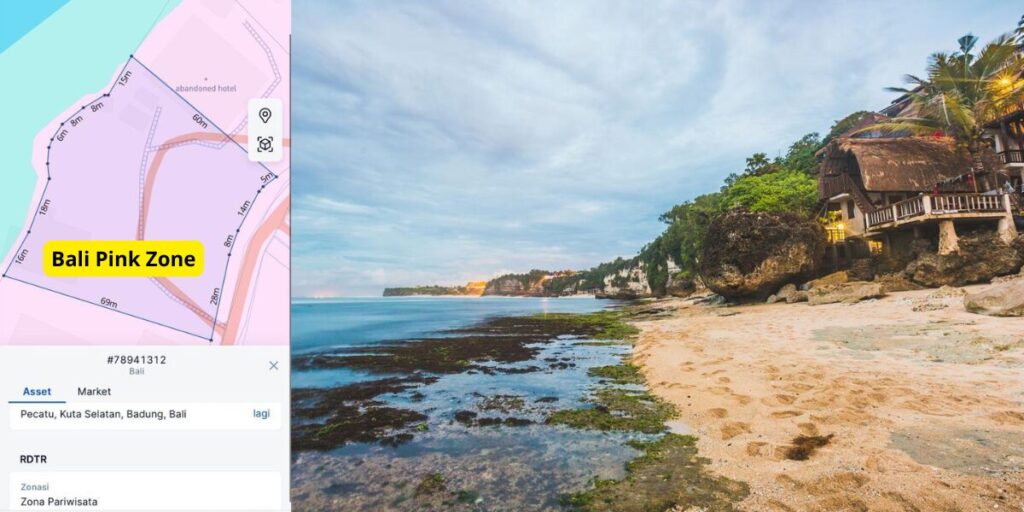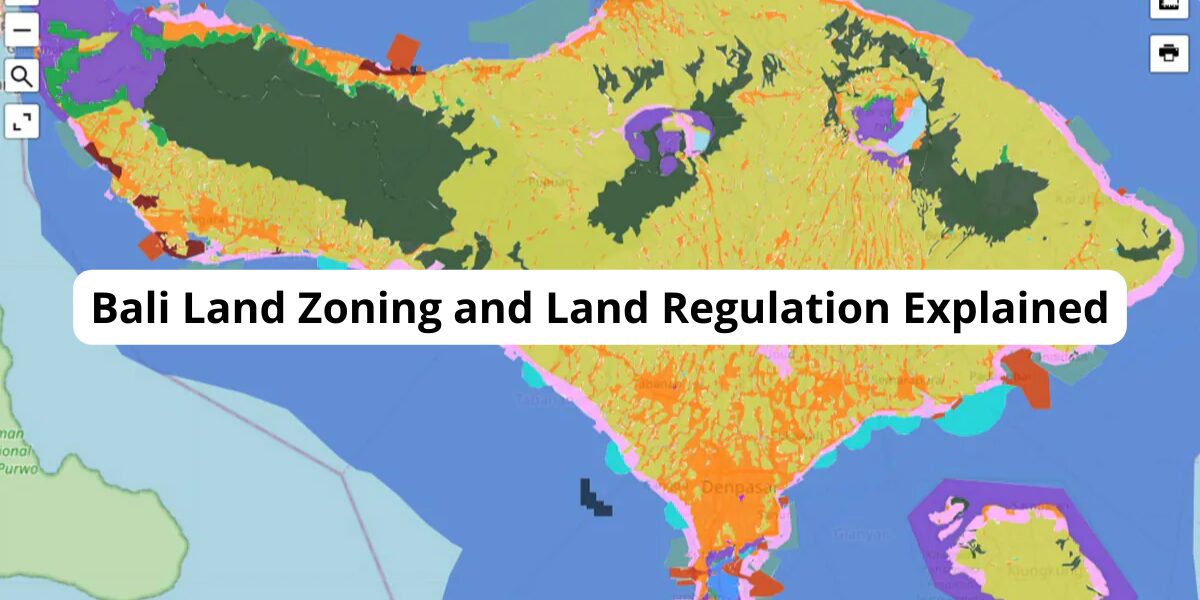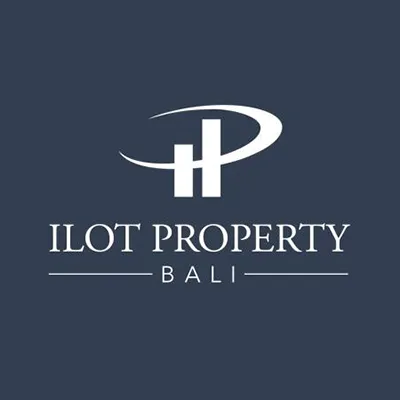Thinking of buying land in Bali? Before you fall in love with that ocean-view plot or lush rice field, there’s one thing you absolutely need to check: Bali land zoning.
Zoning rules in Bali decide what you can (and can’t) do with a piece of land. Pick the wrong zone, and you might end up with land you can’t use legally.
In this guide, we’ll break down the different land zones in Bali, why they matter, and how to make sure your investment is on the right track. Keep reading!
Key Takeaways
- The six main land zoning categories in Bali are Yellow (Residential), Orange (Mixed-Use), Red (Commercial), Pink (Tourism), Green (Agricultural), and Conservation zones.
- You can check a land’s zoning status through Bali’s National Land Agency (RTRW) or consult with a real estate expert for faster, verified information.
- Choosing the right zone helps avoid legal issues and ensures your property can be used as intended, while the wrong zone could block your permits.
Planning a Bali villa? See Ilot Property Bali’s luxury designs here.
What is Bali Land Zoning?
In short, land zoning in Bali defines how land can be used, whether for housing, farming, business, or tourism. While zoning rules are set at the national level, Bali has some flexibility to apply its own regulations.
These zoning rules are designed to keep development and conservation in balance. Some areas are reserved for agriculture, while others are allocated for residential, commercial, or industrial purposes.
That’s why it’s important to understand both national and regional zoning laws when dealing with land in Bali. You must check that the land you’re buying is zoned correctly for your project, be it a villa, hotel, or commercial space.
Types of Bali Land Zoning
Each zone in Bali is designed for specific purposes, with clear rules about what’s allowed. Here’s a breakdown of the main zoning areas:
| Zone Type | Description | Allowed For Building |
|---|---|---|
| Yellow Zone (Residential) | Land designated for residential use, where villas and houses can be built. | Yes (villas and houses) |
| Orange Zone (Higher Density Residential) | Residential use with higher density, often in urban or crowded areas. | Yes (villas, apartments) |
| Red Zone (Commercial) | Designated for commercial activity like shops, restaurants, and offices. | Yes (commercial buildings) |
| Pink Zone (Tourism) | Designed for tourism—hotels, resorts, and rental villas. | Yes (tourism properties) |
| Green Zone (Agricultural) | Reserved for farming, crops, and agriculture. Building is restricted or not allowed. | No |
| Conservation Zone | Areas that protect cultural or natural sites. No commercial or residential development is allowed. Examples: Benoa Bay, Taman Nasional Bali Barat. | No |
For more clarity, you can check the explanation of each zone below.
1. Yellow Zone Bali (Residential Area)

Yellow zones (“Zona Kuning”) are the most common type of land for housing development. They’re where you’re legally allowed to build homes, including private villas.
It’s a popular choice for leasehold titles like Hak Sewa, or for ownership under Hak Pakai and Hak Guna Bangunan for foreigners. These zones play an important role in:
- Urban Growth: Supporting organized city expansion to meet increasing population needs.
- Housing Supply: Ensuring enough land is available for homes, apartments, and villas.
- Community Lifestyle: Developing residential neighborhoods with proper infrastructure and amenities for comfortable living.
Interestingly, yellow-zoned land can also be used for farming on a temporary basis. It’s the only zone where conversion between residential and agricultural use is permitted.
However, keep in mind that each yellow zone area may have different rules on building density and layout—so always review the local area plan before moving forward.
2. Orange Zone Bali (Hybrid of Residential and Commercial Area)

Orange zones (“Zona Komersial dan Permukiman”) are a hybrid of residential and commercial. They allow for both homes and small businesses, offering a practical balance where people can live, work, and play.
These zones are commonly found in semi-urban areas and can cater to both locals and foreign visitors. If you’re planning to live in Bali while also running a small business (like a café, shop, or co-working space), orange zones give you the most versatility.
They’re especially appealing for villa owners looking to use their property as a hybrid residence and income-generating rental.
Read More: How to Start Your Property Rental Business in Bali: Answering Your Burning Questions
3. Red Zone Bali (Commercial Area)

Red zones (“Zona Perdagangan”) are designed for high-density commercial development, such as shopping centers, markets, hotels, bars, and entertainment venues (based on Indonesian Law No. 26 of 2007 on Spatial Planning). Anyone can invest or start their business here, including expatriates and foreign investors.
The red zones has its own characteristics, such as:
- Business Types:
- Retail outlets, supermarkets, and shopping centers
- Offices, co-working spaces, and corporate hubs
- Restaurants, cafés, and entertainment venues
- Infrastructure:
- Easy access via main roads, public transport, and parking facilities
- Reliable utilities such as electricity, water, internet, and waste management
- Zoning Regulations:
- Building codes that prioritize safety and functionality
- Rules for signage, advertising, and business operations to keep order and aesthetics
They are excellent for business ventures, but not ideal if you’re seeking peace and quiet. While direct freehold ownership only for local Indonesian, foreigners can establish their business through structures such as:
- Building-use rights (Hak Guna Bangunan)
- A PT PMA (foreign-owned company)
- Long-term lease agreements (Hak Sewa)
4. Pink Zone Bali (Tourism Area)

Pink zones (“Zona Pariwisata”) are designated areas for the tourism and hospitality industry. On this land, you can build hotels, resorts, and vacation rental villas.
They work like red zones but focus more on tourism. That’s why you’ll often see theme parks, water parks, and cultural centers in these areas.
If you want to buy or build a villa for business, a pink zone is one of the safest and best options. Many people run Airbnbs or holiday rentals here because these areas are close to popular tourist spots like restaurants, shops, bars, and often the beach.
But remember: you can’t use pink zones for housing or industry unless you get a special permit. Anything that could harm the tourist experience or the environment is not allowed as well.
5. Green Zone Bali (Agricultural Area)

Building in Bali’s green zone (“Zona Hijau”) is highly restricted. These areas are reserved for agriculture and often include scenic rice fields, fruit orchards, and natural landscapes.
The green zone serves three main purposes:
- Food Security: Rice terraces, orchards, and vegetable farms in the green zone provide a steady supply of fresh produce for both locals and the tourism industry.
- Cultural Preservation: The zone is deeply connected to traditional Balinese farming and the Subak irrigation system, recognized by UNESCO. Protecting this land keeps cultural identity and heritage alive.
- Environmental Protection: Green zones act as natural buffers, preventing erosion, supporting ecosystems, improving water quality, and maintaining biodiversity.
In these areas, only small farm structures like storage sheds or irrigation systems are typically allowed. Some eco-tourism projects, such as eco-lodges, may also be permitted, but only under strict rules to minimize environmental impact.
It’s important to note that green zone land cannot be converted into another type of zoning. Some agents may “offer” such services, but these are illegal and can lead to serious consequences.
We strongly advise against pursuing such deals, as the risks are too high. For example, Parq Ubud was shut down due to zoning violations.
So, if you’re ever offered cheap land in areas like Ubud or Sanur that seems too good to be true, always double-check the zoning status—it could be a green zone.
Read More: Bali Floods 2025 Trigger Construction Ban on Hotels and Resorts
6. Conservation Zone

Conservation zones (“Zona Konservasi”) are also off-limits for development. These areas are protected to preserve Bali’s natural beauty and cultural heritage, for example, the Nusa Penida Marine Protected Area or Bali Barat National Park.
Key characteristics of conservation zones:
- Types of Protected Areas: National parks, wildlife reserves, marine sanctuaries, forest reserves, wetlands, coastal zones, and cultural or historical sites with ecological value.
- Infrastructure & Access: Limited facilities to reduce human impact, with eco-friendly designs and controlled access to protect sensitive areas.
- Prohibited Activities: Mining, logging, industrial projects, or any land changes that damage the environment.
- Permitted Activities: Eco-tourism, research, education, and conservation projects—as long as they follow strict environmental rules.
Of course, you cannot build commercial or residential properties in conservation zones.
So, what’s the difference between the Green Zone and the Conservation Zone? Here’s the comparison:
| Aspect | Green Zone (Zona Hijau) | Conservation Zone (Zona Konservasi) |
|---|---|---|
| Purpose | Preserve agriculture, cultural practices, and environmental balance | Protect ecosystems, biodiversity, cultural heritage, and natural resources |
| Main Features | – Agricultural land (rice fields, fruit orchards, vegetable patches) – Supports Subak irrigation system – Acts as natural buffer against erosion and flooding | – National parks, marine sanctuaries, wildlife reserves – Forests, wetlands, coastal zones – Cultural/historical sites with ecological value |
| Allowed Activities | – Farming and agriculture – Small farm structures (sheds, irrigation systems) – Ecotourism projects (eco-lodges, bike tours, organic farms) | – Eco-tourism (with strict rules) – Environmental research and education – Conservation-focused projects |
| Prohibited Activities | – Residential or commercial development – Unauthorized villas or tourism buildings – Any non-agricultural construction | – Mining, logging, and industrial activities – Land alteration or harmful construction – Overuse of natural resources |
| Regulations | – Very strict building permits (almost impossible for villas) – Projects must align with agriculture or eco-tourism | – Strict building codes and land-use restrictions – Controlled access to protect fragile areas |
| Examples in Bali | – Jatiluwih Rice Terraces (UNESCO Cultural Landscape) – Subak farming regions – Some areas of Bali Barat National Park & Monkey Forest (agricultural overlap) | – Bali Barat National Park (savannahs, mangroves, rainforests) – Ubud Monkey Forest (sacred forest and temples) – Nusa Penida Marine Protected Area (coral reef and marine biodiversity) |
How Do I Check Land Zoning in Bali?
Each zone has specific rules about what you can and can’t do. Here are some tips to read read a spatial plan, town planning or zoning map correctly:
- Check the Zoning Map (RTRW): Visit Bali’s National Land Agency (BPN) to access the official Bali zoning map (Rencana Tata Ruang Wilayah). This helps you understand what each land zone is legally designated for.
- Hire a Property Lawyer for Due Diligence: A legal expert will help verify land certificates, permits, and ensure the property complies with zoning and building regulations. This step protects you from hidden legal risks.
- Consult a Real Estate Expert for Practical Use: An experienced agent can tell you whether the property suits your intended purpose—whether for a home, rental villa, or business—based on location, zoning type, and market potential.
Additional documents you can download to learn more:
| Documents | Link Download |
| Bali Provincial Spatial Plan (Rencana Tata Ruang Wilayah Provinsi (RTRWP) PDF | Download here |
| Denpasar Zoning Map (All Areas) | Download here |
| South Denpasar Spatial Plan PDF | Download here |
| South Denpasar Zoning Map | Download here |
Read More: Building Villa in Bali as a Foreigner: Full Breakdown
Which Land Zone Brings the Most Money?
If you’re looking for high rental income, the tourism zone (pink zone) is your best bet.
These areas allow for short-term rentals, hotels, and resorts, drawing tourists to popular spots like beaches and shops.
This steady demand makes pink zones a top choice for investors. And with Bali’s tourism on the rise, owning property in a pink zone is one of the best ways to guarantee high returns.

Get a Customized Investment Plan in Bali
With over 12+ years in the market, here’s what we can do for you:
- Find the best location to invest in Bali.
- Reliable guidance on Bali’s property market and laws.
- Personalized strategy to maximize returns and meet your financial goals.
What Happens if You Build in the Wrong Zone?
What could happen if you build your dream villa on land that’s not zoned for it?
- Legal Issues: Building a villa on land that isn’t zoned for residential use can lead to serious legal consequences, including fines or demolition.
- Financial Risks: If your villa is illegal, its value plummets, making it hard to sell. You may also face difficulties getting financing for a non-compliant property.
- Permit Problems: Building without the right permits can halt construction and make renting or selling the property legally impossible.
- Environmental Concerns: Building in protected areas can harm local ecosystems and upset communities, leading to potential legal action or pushback from locals.
FAQ
1. Can you build on green zone Bali?
No. No building permits will be issued for development in green zones.
2. Can the zone of a property be changed?
Changing a property’s zoning is rare and involves a lengthy process. It’s generally better to find land already zoned for your intended use rather than attempt to change it.
3. Are foreigners allowed to own land in Bali?
Yes, foreigners can purchase property in Bali, but only under certain restrictions that regulate foreign ownership in Indonesia.
Conclusion: Smart Investors Always Check Zoning First
Bali has six main zones you need to understand before buying or building: red, yellow, orange, green, pink, and conservation zones.
We often see new investors jump straight into the numbers—how much they can earn, how fast they can rent it out. But here’s the truth: if the land isn’t in the right zone, that dream investment can quickly turn into a nightmare.
Don’t want to deal with all the zoning and legal stuff? Don’t worry—we’ve got you covered.
Our team at Ilot Property Bali can verify the land for you and answer any questions about building or buying a villa in Bali. Click here to book a free consultation anytime—it’s 100% free and no obligation.
You can also browse our curated land listings through this link. Every plot has been carefully checked and approved by our local agents, so you can move forward with confidence knowing it’s safe, legal, and ready to build on.


